Toshiba Corporation commonly referred to as Toshiba is a Japanese multinational conglomerate with headquarters in Minato, Tokyo, Japan. Offering consumers diverse products the company has been able to get a firm grasp on major industries in the world. Working on power industries, system elevators and escalators, semiconductors, hard disk drives, electronic components, lighting, batteries, printers, quantum cryptography, and so much more.
In order to manage its interests, the company has broken down into personal computers, consumer electronics, home appliances, medical equipment, and so on. Making sure every single industry is well covered and offers a wide selection of products all based on market research and consumer needs.
There is a time in your life when the most reliable appliance you have starts to show an error. While it might be a dark day, fortunately for you there is a simple solution for most error codes. To help you out we have accumulated a complete list of the Toshiba air conditioner error codes. Offering you a chance to find out exactly what is wrong with your appliance, so you can finally make a decision. Rather than fighting with the appliance, or spending endless money on the repair, we suggest you first find the problem and then look for a solution.
Codes List
E01: No communication between remote controller and indoor unit.
E02: Local controller failure – unable to transmit.
E03: Master indoor unit receives no data to A-B.
E04: Indoor unit (except twin slave) receives no communications from outdoor unit; can also include klixon on discharge pipe of outdoor unit.
E08: Duplicated indoor unit address.
E09: 2 local controllers connected on a group – both configured as masters.
E10: Indoor unit PSB failure.
E18: Communications failure between master indoor unit and slave indoor unit or units.
F01: Indoor unit TCJ (Liquid) sensor error (Open or Closed circuit resistance is measured in kΩ.
F02: Indoor unit TC2 (Vapour) sensor error (Open or Closed circuit – resistance is measured in kΩ.
F04: Outdoor unit TD (Discharge) sensor error (Open or Closed circuit – resistance is measured in kΩ.
F06: Outdoor unit TE (Coil) sensor error (Open or Closed circuit – resistance is emasured in kΩ.
F08: Outdoor unit TO (Ambient) sensor error (Open or Closed circuit – resistance is measured in kΩ.
F10: Indoor unit TA (Return Air) sensor error ) Open or Closed circuit – resistance is measure in kΩ.
F29: Indoor unit PCB failure.
H01: Outdoor unit inverter compressor over current detected.
H02: Master outdoor unit over current detected shortly after start up.
H03: Current detected on Master outdoor unit whilst idle.
H06: Outdoor unit Low pressure detected by Ps sensor (0.2 bar -n 2.9 psig).
L03: Indoor unit Duplicated master indoor units in a group.
L07: Indoor unit in a group of units previously addressed as a single unit – check addressing.
L08: Indoor units addresses not set – check addressing.
L09: Indoor units capacity not set (check DN Code 11).
L29: Outdoor unit IPDU error (Number of detected IPDU units is reduced).
L30: Input on indoor PCB CN80 circuit for 1 minute.
L31: Outdoor unit PCB error.
P01: Indoor unit fan motor error.
P03: Outdoor unit high discharge temperature (TD1 exceeded 115°C).
P04: Outdoor unit high pressure switch activated (Detected by high temperature on TE sensor on digital/super digital inverter units).
P07: Outdoor unit PCB heat sink overheated (Temperature over 90°C recorded).
P10: Indoor unit Float switch activated.
P12: Indoor unit fan motor error – detected by feedback circuit.
P19: Wrong change in temperature recorded (4 way valve error).
P22: Outdoor unit fan motor IPDU error.
P26: Outdoor unit giant transistor short circuit.
P29: Outdoor unit Compressor error detected by feedback circuit.
P30: Indoor unit Group control follower unit error / duplicated central control addresses.
P31: Indoor unit PCB error.
C05: Central control Sending error in TCC-Link central control device.
C06: Central control Receive error in TCC-Link central control device.
C12: Batch alarm for general purpose equipment interface.
Remote Control Display Meaning
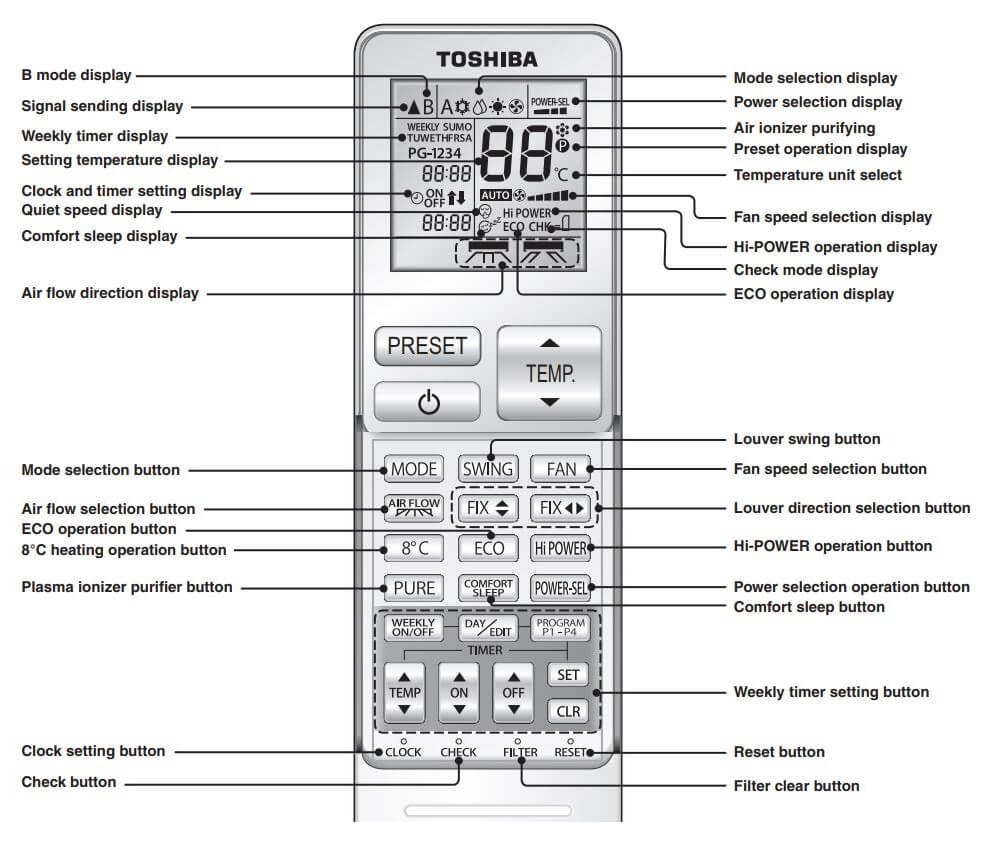
Indoor Unit Codes
| Error Codes | Cause |
|---|---|
| E03 | No communication from remote controller (including wireless) and communication adapter |
| E04 | The serial signal is not output from outdoor unit to indoor unit. Miswiring of inter-unit wire. Defective serial sending circuit on outdoor P.C. board. Defective serial receiving circuit on indoor P.C. board. |
| E08 | Duplicated indoor unit address |
| L03 | Duplicated indoor master unit |
| L07 | There is group wire in individual indoor unit. |
| L08 | Unset indoor group address |
| L09 | Unset indoor capacity |
| L30 | Abnormal input of outside interlock |
| P10 | Float switch operation. Float circuit, Disconnection, Coming-off, Float switch contact error |
| P12 | Indoor DC fan error |
| P19 | 4-way valve system error. |
| P31 | Own unit stops while warning is output to other indoor units. |
| F01 | Coming-off, disconnection or short of indoor heat exchanger temp. sensor (TCJ) |
| F02 | Coming-off, disconnection or short of indoor heat exchanger temp. sensor (TC) |
| F10 | Coming-off, disconnection or short of indoor heat exchanger temp. sensor (TA) |
| F29 | Indoor EEPROM error. Check indoor P.C. board. |
| E10 | Communication error between indoor MCU |
| E11 | Communication error between Application and indoor unit |
| E18 | Regular communication error between indoor master and follower units and between main and sub units |
Outdoor Unit Codes
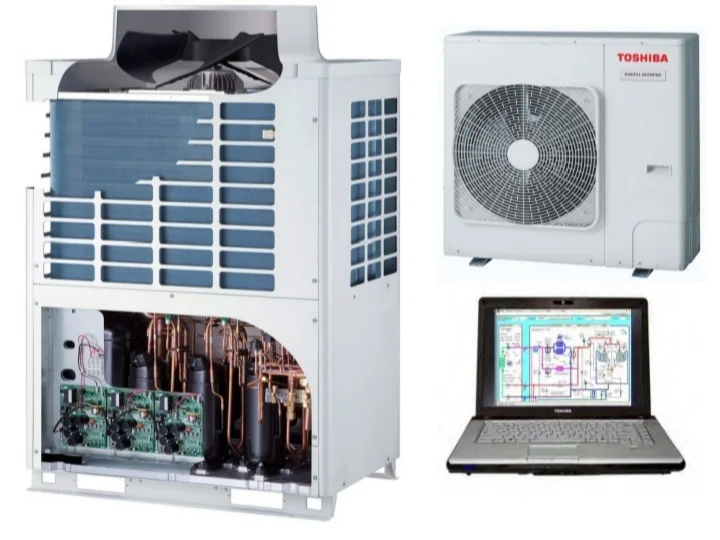
| Error Codes | Meaning |
|---|---|
| F04 | Disconnection, short of discharge temp. sensor (TD) |
| F06 | Disconnection, short of heat exchanger temp. sensor (TE) |
| F07 | Disconnection, short of heat exchanger temp. sensor (TL) |
| F12 | Disconnection, short of suction temp. sensor (TS) |
| F15 | Miss-mounting of outdoor temp. sensor (TE, TS) |
| F08 | Disconnection, short of outside air temp. sensor (TO) |
| F13 | Disconnection, short of heat sink temp. sensor (TH) |
| F31 | Outdoor EEPROM error |
| L10 | Unset model type of service P.C. board |
| P07 | Heat sink overheat error |
| P15 | Detection of gas leak |
| P19 | 4-way valve inverse error |
| H01 | Compressor break down |
| H02 | Compressor lock |
| H03 | Current detection circuit error |
| H04 | Case thermostat operation. Abnormal overheat of compressor |
| P03 | Discharge temp. error |
| P04 | High pressure SW system error |
| P05 | Power supply voltage error |
| P20 | High pressure protective operation |
| P22 | Outdoor fan system error |
| P26 | Short-circuit error of compressor driving element |
| P29 | Position detection circuit error |
Multi VRF Codes
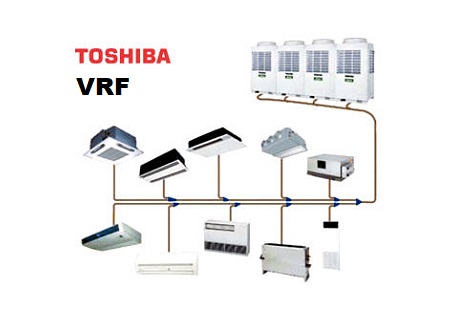
| Error Codes | Cause |
|---|---|
| E06 | Decrease of number of indoor units |
| E07 | Indoor/Outdoor communication circuit error |
| E08 | Duplication of indoor addresses |
| E12 | Automatic address start error |
| E15 | Indoor is nothing during automatic addressing |
| E16 | Capacity over / Number of connected indoor units |
| E19 | Number of header outdoor units error |
| E20 | Other line connected during automatic addressing |
| E23 | Sending error between outdoor units communication |
| E25 | Duplicated follower outdoor address setup |
| E26 | Decrease of connected outdoor units |
| E28 | Follower outdoor unit error |
| E31 | IPDU communication error |
| F04 | TD1 sensor error |
| F05 | TD2 sensor error |
| F06 | TE1 sensor error |
| F07 | TL sensor error |
| F08 | TO sensor error |
| F12 | TS1 sensor error |
| F13 | TH sensor error |
| F15 | Outdoor temp. sensor miswiring (TE, TL) |
| F16 | Outdoor pressure sensor miswiring (Pd, Ps) |
| F23 | Ps sensor error |
| F24 | Pd sensor error |
| F31 | Outdoor EEPROM error |
| H01 | Compressor breakdown |
| H02 | Magnet switch error |
| H03 | Current detective circuit system error |
| H04 | Compressor 1 case thermo operation |
| H06 | Low-pressure protective operation |
| H07 | Oil level down detection protection |
| H08 | Temp sensor error for oil level detection |
| H14 | Compressor 2 case thermo operation |
| H16 | Magnet switch error |
| L04 | Outdoor system address duplicated |
| L06 | Duplication of indoor units with priority |
| L08 | Indoor group/Address unset |
| L10 | Outdoor capacity unset |
| L28 | Outdoor connected quantity over |
| L29 | IPDU quantity error |
| L30 | External interlock of indoor unit |
| L31 | Extended I/C error |
| P03 | Discharge temp TD1 error |
| P04 | High-pressure SW system operation |
| P05 | Phase missing detection / Phase order error |
| P07 | Heat sink overheat error |
| P10 | Indoor overflow error |
| P13 | Outdoor liquid back detection error |
| P15 | Gas leak detection |
| P17 | Discharge temp. TD2 error |
| P19 | 4-way valve inverse error |
| P20 | High-pressure protective operation |
| P22 | Outdoor fan IPDU error |
| P26 | IGBT short protection error |
| P29 | Compressor position detective circuit system error |
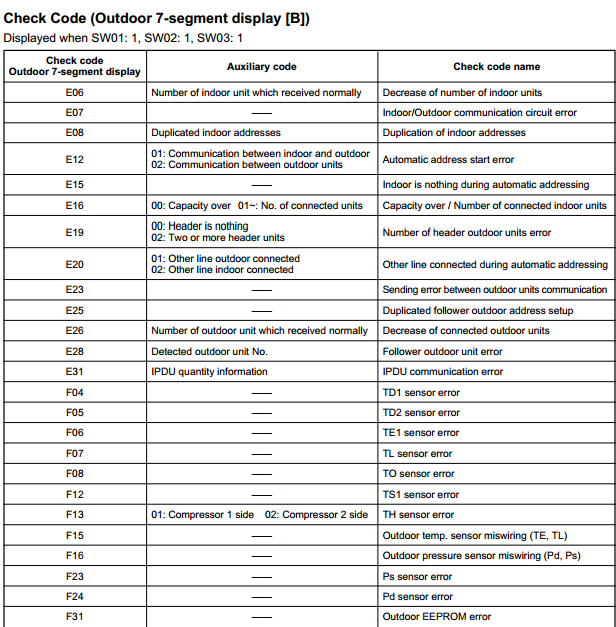
Portable AC Codes
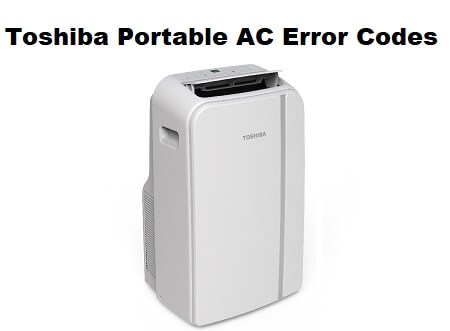
Shows Error codes and Protection Codes:
- E1 – Room temperature sensor error.
- E2 – Evaporator temperature sensor error.
- E3 – Condenser temperature sensor error (select models).
- E4 – Display panel communication error.
- P1 – Bottom tray is full – Connect the drain hose and drain the collected water away.If protection code repeats, call for service.
Timer and Operation Light Flashing

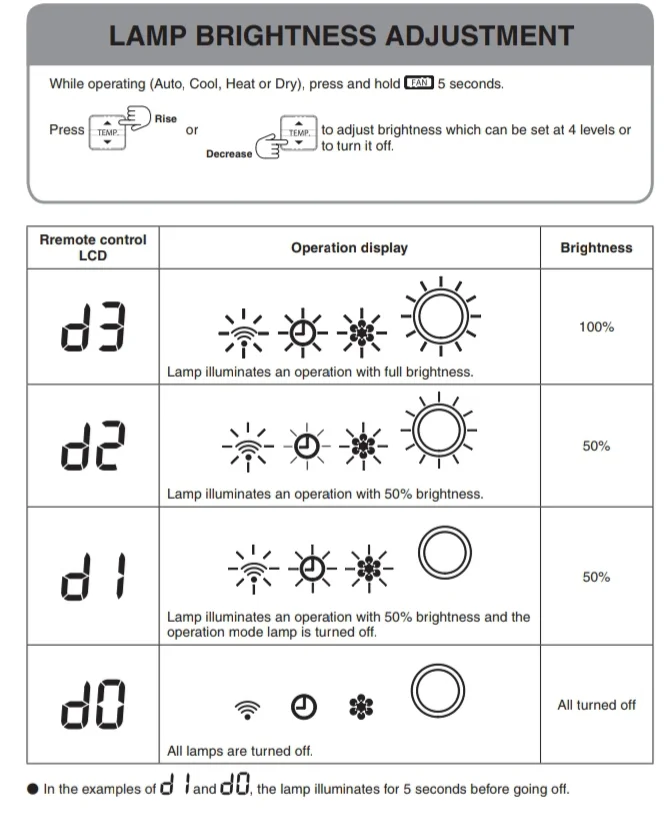
Wiring Diagram
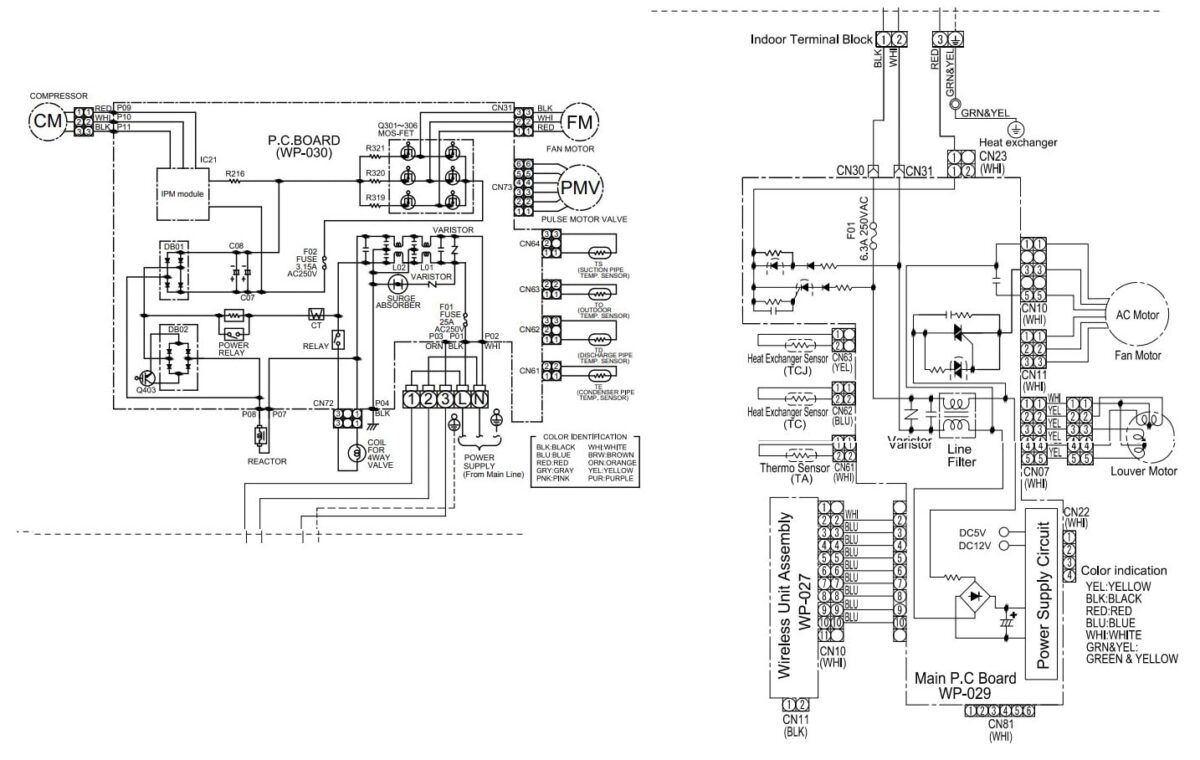
Manuals Pdf
Wall Type Air Conditioning Manual
Super Heat Recovery Multi Type Service Manual
Super Modular Multi AC Service Manual
Self-Diagnosis by Remote Controller (Check Code)
References
ahi-toshibasa.co.za/news-articles/air-conditioner-issues-and-causes/
- Unionaire Air Conditioner Error Codes - December 1, 2025
- Ameristar AC Error Codes and Troubleshooting - December 1, 2025
- Rheem Pool Heat Pump Error Codes - December 1, 2025

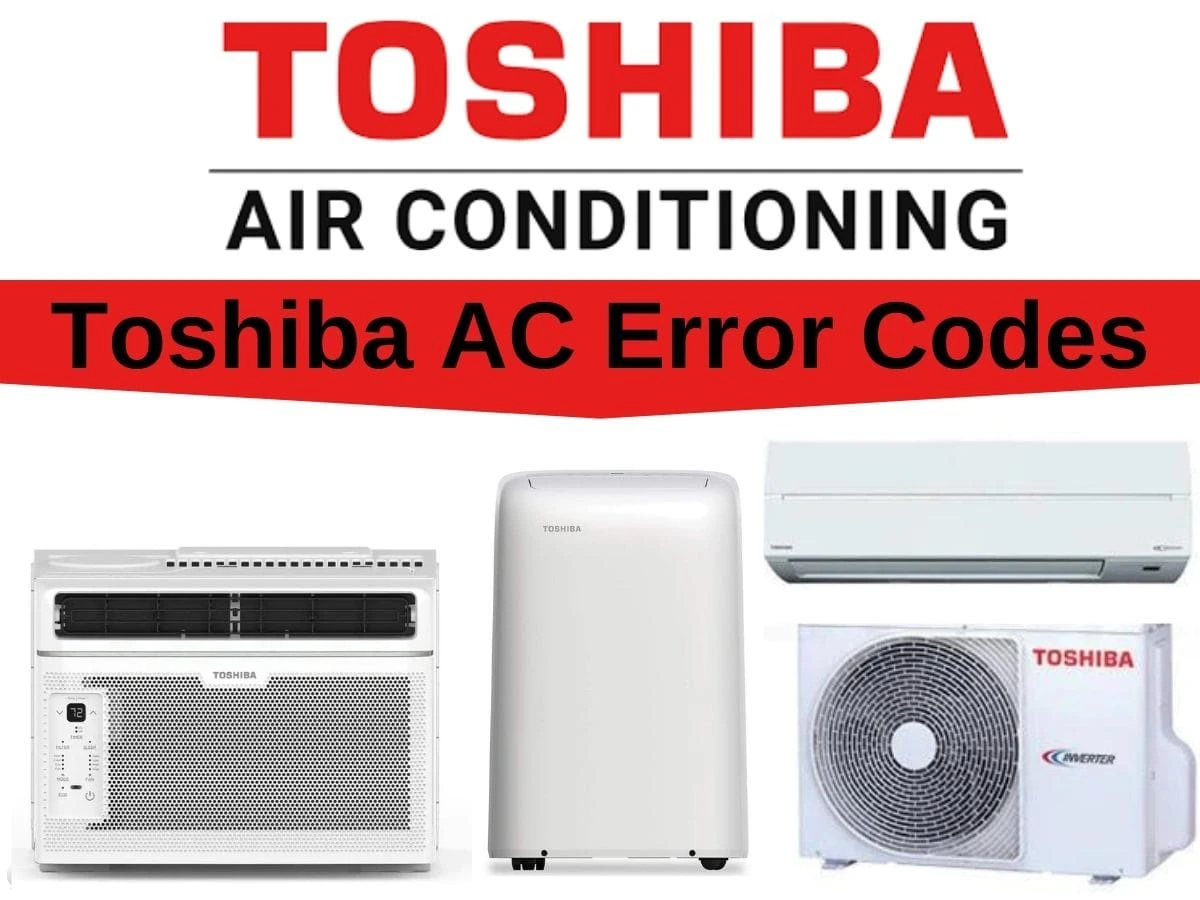
I’m receiving 2 error codes EL and OC, what do they mean. The unit runs for a period of time and shuts off. I power off and and power on then it runs for another period of time and shuts off.
Following. I’m getting the same codes and response from my unit…
This app helpful for me thank you and
Please send me how to purchase Toshiba VRV PCB please send link
I have a code AP that is not listed in the book. Please assist
Same here. Also, our AC will randomly decide to change its own settings. Don’t think I will be buying another Toshiba AC.
Any luck with what the AP code is? I’m having that displayed too…
Thank you sir